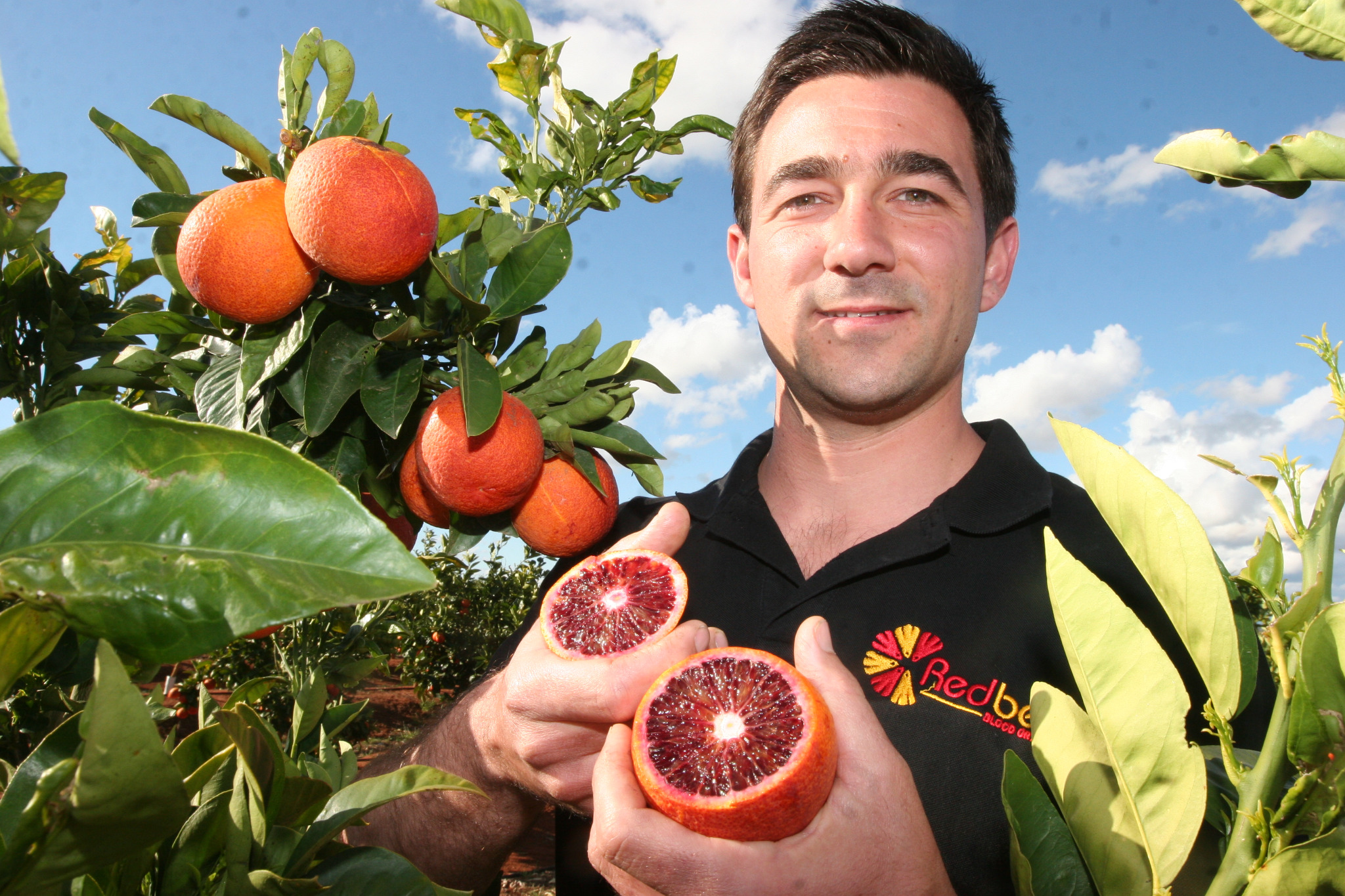Oranges are in the blood

Vito Mancini, of Redbelly Citrus. PHOTO: SANDRA GODWIN
AT A time when diversification was still the watch-word for agriculture, three Griffith cousins decided it was high time to specialise.
As young boys, Vito Mancini and his cousins, Leonard and Anthony, savoured exotic blood oranges from their grandfather's backyard tree.
As young men, they couldn't understand why it was so difficult to buy blood oranges and why none of the district's farmers - including their fathers - produced them.
"It was always in the back of my head, why hasn't it ever been commercialised?" Vito said. "We loved the fruit."
Almost eight years ago, they formed a partnership and decided to use the Redbelly Citrus name for marketing their fruit.
Leonard and Anthony had a property producing wine grapes.
Vito, who already worked with his father, Domenic, on two citrus orchards growing navels and valencias, bought a greenfield site near Lake Wyangan.
Each yearned to build a business with potential, that would survive for more than five years.
"The majority of citrus farmers have no long-term plan because of pricing," Vito said. "We take it day by day. I had to stop picking navels last (month), because they were only making $6 for a 20kg carton. I knew that if I planted up 50 acres (20ha) of navels or valencias the market forces are too unpredictable. There's no way to create a brand or control the marketplace."
As well as considering standard citrus lines, the Mancinis tossed up the merits of pomegranates and almonds.
But they kept coming back to blood oranges.
Blood oranges are noted for their dark skin, distinctive flavour and rich-red flesh, caused by the production of anthocyanins, also found in berries and red-wine grapes.
But they aren't easy to grow.
"It takes a lot of fertiliser manipulation," Vito said. "There are special ways to prune the tree to allow light in, but not too much light, because that causes fading of the skin."
In late 2007 the trio leapt in, boots and all.
Leonard and Anthony contracted a nursery in Sunraysia to grow their trees.
Vito grew his own from seed. They were 18 months younger, but cost a third of the price and he was able to grow the rootstock and varieties he wanted in the shape he wanted.
They now have 32,000 blood-orange trees between them.
Vito's block is planted mainly to the arnold variety, but newer plantings include meli, rosso and ippolito.
The high-density plantings of 1000 trees/ha range in age from three to five years old.
By the time the trees reach full production, the canopies should provide enough shade to reduce skin bleaching, which comes with overexposure to sun on the western side of the rows.
Harvest is from August, with flowering for next year's crop starting this month.
After losing 25 per cent of this year's crop to frost at flowering and flooding in March, the Mancinis expect the final tally for their third harvest to be about 300 tonnes.
They hope to double production each year, reaching 2000 tonnes by 2015.
Each of the relations has a role reflecting his strengths and experience. A Sydney lawyer, Leonard is in charge of marketing, Anthony manages the agronomy and Vito, with a background in IT, co-ordinates packing and planning.
Fruit packed under the Redbelly Citrus name goes to wholesale markets in Brisbane, Sydney and Melbourne.
Value-added products - including cordial, marmalade and syrup - bearing the RedOrange label provide an outlet for fruit that is too small or marked.
"Blood oranges are known for small fruit," Vito said. "We can't be dumping 10 per cent of the fruit for no good reason."
Juicing trials have begun and they recently shipped a sample to the US, where a buyer is interested in using frozen blood-orange juice for high-pressure pasteurisation.
"The game plan is, once we get to full production, we'll set aside about 400 tonnes for the supermarkets, 400 tonnes for independent greengrocers, 400 tonnes for export and 600-800 tonnes for juicing," Vito said. "Blood oranges will always be a niche. If we go along and try to commoditise it, that would be a mistake. We would just be where washington navels are at the moment or valencias or wine grapes for that matter. You either have to grow the industry to be a huge world market player or you have to have a niche. That's where we see blood oranges working for us."
For more details, go to redbellycitrus.com.au or phone 0412 690 481.
